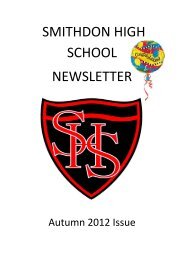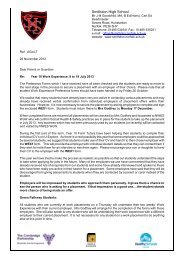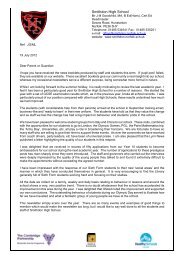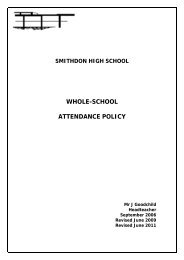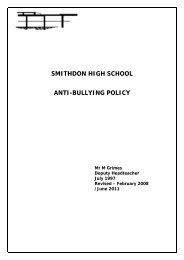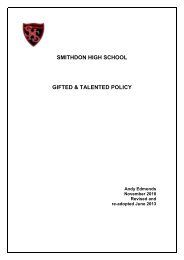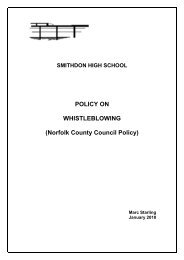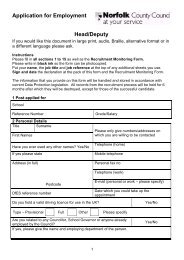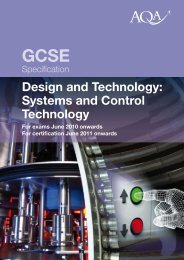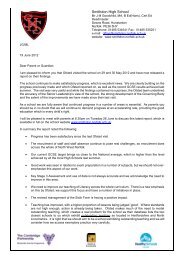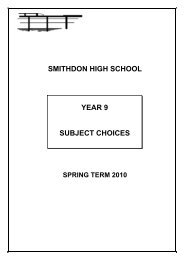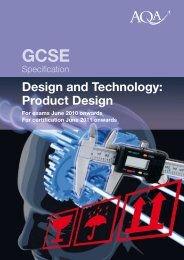Educational Visits - Smithdon High School, Hunstanton, Norfolk
Educational Visits - Smithdon High School, Hunstanton, Norfolk
Educational Visits - Smithdon High School, Hunstanton, Norfolk
Create successful ePaper yourself
Turn your PDF publications into a flip-book with our unique Google optimized e-Paper software.
4. Regulations and Good Practice<br />
1. The educational objectives of the visit must be clearly defined.<br />
2. Adequate staffing must be provided to ensure effective supervision at all<br />
times. Actual numbers will depend on the nature of the activity and the<br />
venue and should be discussed with the EVC. There are no longer set ratios.<br />
3. Both male and female staff should be represented on residential or overseas<br />
trips. On day trips this is advisable, but not essential in all circumstances.<br />
4. All residential trips in term time must provide supply cover costs for teaching<br />
staff involved. All day trips involving two or more teaching staff must provide<br />
supply costs for a proportion of the staff involved. Group leaders should<br />
agree these arrangements with the EVC in the early stages of planning.<br />
5. Group leaders should ensure that any transport companies or tour<br />
companies used are reputable. In the case of tour companies these should<br />
be ABTA bonded.<br />
6. For residential activities the detailed itinerary required by the LA should also<br />
be distributed to parents. Photocopies of passports should be made and<br />
carried when abroad in case of loss by any participant.<br />
7. A list of participants should be left with the front office and a further list posted<br />
on the intranet at least 5 days prior to departure.<br />
8. Participants on overseas trips should be provided with a laminated identity<br />
card containing a passport photograph, their name and the address of their<br />
accommodation abroad.<br />
9. All participatory students must be on the current roll of the school. It is not<br />
appropriate to take former students, etc over whom the school has no formal<br />
duty of care.<br />
10. Staffing, particularly for residential trips, must be agreed in advance with the<br />
EVC, who will consider the appropriate balance of experience, etc. It should<br />
be noted that regulations now refer to ‘appropriate adults’ and it is not always<br />
necessary for visit leaders to be teaching staff.<br />
11. The case of any student volunteers as assistant supervisors or helpers<br />
MUST be discussed with the EVC in advance. Specific approval must be<br />
granted for individuals. It is likely that a CRB will be required and time will<br />
need to be allowed for this to be processed.<br />
12. The presence of family members as either supervisor or participating student<br />
can raise questions of a possible conflict of interest in the minds of some<br />
parents. This is therefore not regarded as good practice, although may be<br />
permitted in certain circumstances, with appropriate safeguards.<br />
13. Permission will normally only be granted for visits involving Years 11, 12 or<br />
13 during the autumn term. The only visits permitted in the spring/summer<br />
terms will have the clearest possible impact on public examination<br />
performance. Care will also be exercised with regard to Year 10, who have<br />
modular examinations.<br />
14. All visits start and end at the school. Students may not be dropped off enroute.<br />
15. The participants in a visit should all be from one Key Stage. It is seldom<br />
appropriate to mix Main <strong>School</strong> and Sixth Form pupils, as this can blur<br />
acceptable boundaries.<br />
5



